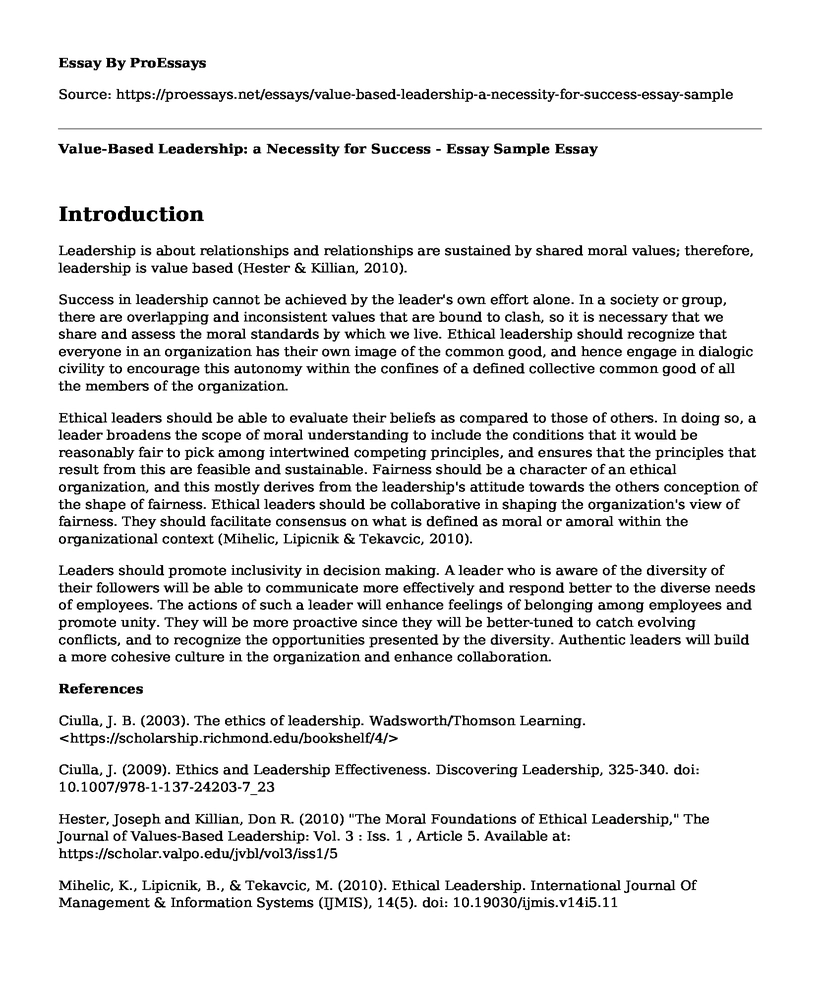Introduction
Leadership is about relationships and relationships are sustained by shared moral values; therefore, leadership is value based (Hester & Killian, 2010).
Success in leadership cannot be achieved by the leader's own effort alone. In a society or group, there are overlapping and inconsistent values that are bound to clash, so it is necessary that we share and assess the moral standards by which we live. Ethical leadership should recognize that everyone in an organization has their own image of the common good, and hence engage in dialogic civility to encourage this autonomy within the confines of a defined collective common good of all the members of the organization.
Ethical leaders should be able to evaluate their beliefs as compared to those of others. In doing so, a leader broadens the scope of moral understanding to include the conditions that it would be reasonably fair to pick among intertwined competing principles, and ensures that the principles that result from this are feasible and sustainable. Fairness should be a character of an ethical organization, and this mostly derives from the leadership's attitude towards the others conception of the shape of fairness. Ethical leaders should be collaborative in shaping the organization's view of fairness. They should facilitate consensus on what is defined as moral or amoral within the organizational context (Mihelic, Lipicnik & Tekavcic, 2010).
Leaders should promote inclusivity in decision making. A leader who is aware of the diversity of their followers will be able to communicate more effectively and respond better to the diverse needs of employees. The actions of such a leader will enhance feelings of belonging among employees and promote unity. They will be more proactive since they will be better-tuned to catch evolving conflicts, and to recognize the opportunities presented by the diversity. Authentic leaders will build a more cohesive culture in the organization and enhance collaboration.
References
Ciulla, J. B. (2003). The ethics of leadership. Wadsworth/Thomson Learning. <https://scholarship.richmond.edu/bookshelf/4/>
Ciulla, J. (2009). Ethics and Leadership Effectiveness. Discovering Leadership, 325-340. doi: 10.1007/978-1-137-24203-7_23
Hester, Joseph and Killian, Don R. (2010) "The Moral Foundations of Ethical Leadership," The Journal of Values-Based Leadership: Vol. 3 : Iss. 1 , Article 5. Available at: https://scholar.valpo.edu/jvbl/vol3/iss1/5
Mihelic, K., Lipicnik, B., & Tekavcic, M. (2010). Ethical Leadership. International Journal Of Management & Information Systems (IJMIS), 14(5). doi: 10.19030/ijmis.v14i5.11
Trevino, L. K., Brown, M., & Hartman, L. P. (2003). A qualitative investigation of perceived executive ethical leadership: Perceptions from inside and outside the executive suite. Human relations, 56(1), 5-37. https://doi.org/10.1177/0018726703056001448
Trevino, L., Brown, M., & Hartman, L. (2003). A Qualitative Investigation of Perceived Executive Ethical Leadership: Perceptions from Inside and Outside the Executive Suite. Human Relations, 56(1), 5-37. doi: 10.1177/0018726703056001448
Cite this page
Value-Based Leadership: a Necessity for Success - Essay Sample. (2023, Jul 19). Retrieved from https://proessays.net/essays/value-based-leadership-a-necessity-for-success-essay-sample
If you are the original author of this essay and no longer wish to have it published on the ProEssays website, please click below to request its removal:
- Ethics in Organizational Decision-Making
- Ethical Case: Provisions on Accepting Gifts
- Disney and 21st Century Fox Companies Analysis Paper Example
- Essay Sample on Christian Leaders: Showing People the Path to Righteousness
- Paper Example on Nike: A Global Powerhouse in Sportswear Since 1964
- Essay Example on Liquidation Damages: A Remedy for Breach of Contract
- Essay on Leadership and Responsibilities of Military Sergeants: Ensuring Operational Efficiency







